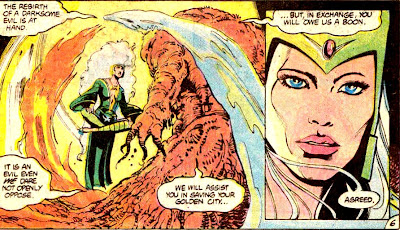Faster-than-light travel is a staple of most science fiction: It’s hard to get strange new worlds and strange new lifeforms without it. There are a lot of different methods that turn up in fiction to get around, and the method that is the one “that works” in a given setting has implications on how adventures play out and even what sort of adventures are possible.
In
Star Trek (and a number of other sci-fi universes), for instance,
warp drive is the way it’s done. While the theory doesn’t always reflect the way it appears in story, warp drive is essential a means for going superluminal but just kind of ignoring Einstein. Ships still seem to interact with things around them as if they were traveling at “normal” sort of velocities. This makes high-speed space battles do-able, and FTL travel itself doesn’t play a part in where bases or settlements will be put. Space travel is easily (maybe a little too easily) analogized to earthly exploration and warfare.
On common method is via
hyperdrives or jump drives. Essentially these provide FTL via transfer to another dimension (“
hyperspace”) where the usual physical laws don’t apply. This sort of travel comes with a lot of variants, but there are two factors that make the most difference: instantaneous vs. noninstantaneous and
gates vs. no gates.
In the instantaneous variety, not much time (if any) is spent in hyperspace; it’s essentially teleportation. This means no FTL battles and perhaps no FTL chases. The tense moments are the ones leading up to the “jump,” because once that’s accomplished pursuers are lost and getaways made. (There is a variant where jumps might be short, defined distances, in which case you could have a sort of stuttering chase.) Like with warp drive, most of your adventuring time is spent in normal space, so the implications for setting design are pretty similar.
Noninstantaneous travel means ships spend some time in hyperspace. This allows chases (and possibly battles) in hyperspace, but also means that stuff can go on onboard a ship while the travelers maybe out of touch with the rest of the world. Also, hyperspace can have exotic hazards and even life. It becomes another interesting place to visit, not just a means for travel.
Nongated jumps mean a ship can do it on it’s on, whereas gated ones required specific structures or locations. Here, gates become places to meet and places to fight. Interstellar travel has choke points and routes like interstate highways. This can move space travel away from being like “ships at sea” to “like longhaul trucking.” Maybe (like in
Cowboy Bebop) gates have tolls, so you could be stuck in one place until you’ve got the cash to proceed.
Anyway, there are other variables to consider (like whether people are awake in FTL or have to go into some sort of suspended animation). My purpose it not to give an exhaustive coverage of them all, but to suggest that these things aren’t just color or window dressing, but have implications for how the setting plays out and its feel.





















